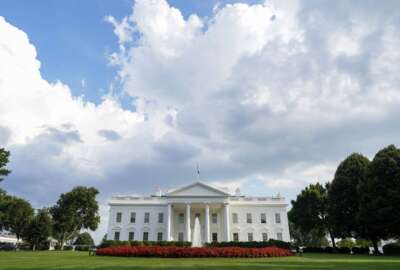The Federal Headlines is a daily compilation of the stories you hear discussed on the Federal Drive.
- The Veterans Affairs Department fired three more senior executives at the Phoenix VA hospital. The center’s associate director, Lance Robinson, Chief of Health Administration Service Brad Curry, and Chief of Staff Darren Deering were all let go. They were managers when the wait time scandals at the Phoenix hospital became public in 2014. Robinson and Curry can appeal their removals to the Merit Systems Protection Board. Deering can appeal through the VA’s administrative grievance process. (Federal News Radio)
- Maj. Gen. Stephen Fogarty, who was the Army’s commanding general at the Cyber Center for Excellence in Georgia, will be the new chief of staff for U.S. Cyber Command in Maryland. Also Maj. Gen. Cedric Wins will be the new commanding general for the Research, Development and Engineering Command at Aberdeen Proving Ground, Maryland. (Defense Department)
- The Navy is planning to conduct more full-ship shock trials on one of its Littoral Combat Ships this year. FSST’s involve detonating explosives underwater near the ship to test durability. The Navy awarded a nearly $11 million contract to Lockheed Martin Mission Systems to make repairs in between shots and to fully repair the USS Milwaukee once the test is over. (Defense Department)
- Several agencies laid out the new procurement and contracting regulations that will be coming this year. Federal Acquisition Regulation council agencies published their semiannual regulator agendas. It says they plan on finalizing 17 proposed rules that pertain to areas like labor and environmental protection. There are also several rules to protect whistleblowers. (Federal Register)
- The Internal Revenue Service left out a few thousand people as it contacted and tried to help victims of its Get Transcript breach last May. The Treasury Inspector General for Tax Administration said roughly 2,400 more people were affected by the breach than the IRS first identified. It also failed to offer free identity protection services to 79,000 victims and put identity theft markers on tax accounts for about 3,200 people who were affected. (Treasury Department)
- The cybersecurity practices of another agency are being called insufficient. The Security and Exchange Commission’s inspector general said the Security and Exchange Commission’s Office of Information Technology failed to apply security upgrades in key areas. For instance, it found old user accounts were still active and reviewing procedures were not always implemented. (Security and Exchange Commission Office of Inspector General)
- The Homeland Security Department picked Raytheon once again for its $1 billion cybersecurity services contract. DHS initially hired Raytheon in September. But Northrop Grumman protested that contract. Raytheon said DHS pulled the award back and re-looked at the bids. Eight months later, DHS decided Raytheon was the most qualified vendor to run the DOMino program after all. The goal of the DOMino program is to maintain and improve the intrusion protection and detection system known as EINSTEIN, and for other cyber tools under the National Cybersecurity Protection System. (Federal News Radio)
- Defense Secretary Ash Carter nominated Lt. Gen. Tod Wolters to command U.S. Air Forces Europe and Africa, and of Allied Air Command. Wolters picked up his fourth star. Maj. Gen. Jeffrey Harrigian was named commander of Air Forces Central Command, and Maj. Gen. Stayce Harris wass nominated for vice chief of staff and director of the Pentagon air staff. Both would get a third star. (Defense Department)
- Your agency’s customer service score depends on who you ask. The Transportation Security Administration was dinged for only asking TSA Pre-Check fliers if they were satisfied. So TSA received a score of 99 percent. With Pre-Check approval, which costs $85 for five years, passengers avoid much of the airport screening hassle. Rep. Henry Cuellar (D-Texas) asked what the TSA satisfaction score would be if it sampled flyers in the regular screening lines. (Federal News Radio)
Copyright
© 2024 Federal News Network. All rights reserved. This website is not intended for users located within the European Economic Area.





